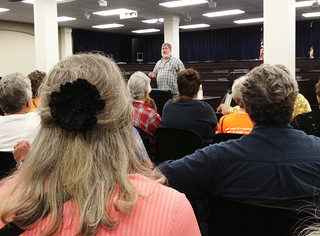Residents shut out of pipeline hearing, find ways to convey their message

Kentuckians came from all over the state – especially from communities along the potential route of the opposed Bluegrass Pipeline – to Frankfort on Thursday afternoon for a hearing about the pipeline, sending a message to legislators that the proposed project is not welcome.
The hearing was of the Interim Joint Committee on Natural Resources and the Environment. Representatives of Williams and Boardwalk Pipeline Partners, the two companies wanting to build the natural gas liquids pipeline, addressed the committee, along with Len Peters, secretary of the Energy and Environment Cabinet, and a representative from the Public Service Commission. Tom Fitzgerald of the Kentucky Resources Council also testified, focusing on safety concerns, the need for some state agency to have regulatory oversight of the pipeline, and the legislature’s need to address Williams’ problematic and unproved assertion that it has eminent domain.
No testimony from anyone who lives in a community along the projected route of the proposed pipeline was taken, although committee chair Sen. Jared Carpenter acknowledged many such requests from affected residents. He suggested there would be additional opportunities for others to be heard, at a committee meeting later this year or during the 2014 regular legislative session. Carpenter did, however, invite representatives of the oil and gas association, who were not on the agenda, to speak and promote the project.
But folks did send a very clear and strong message by their presence. The committee hearing room – capacity 250 – was packed and more than 50 people watched on TVs in an adjacent overflow room.
They scoffed as the Williams and Boardwalk representatives recited the ways in which the proposed pipeline would “benefit Kentucky” by making it possible to create plastics more cheaply, and assuring the committee members that the pipeline would be a good neighbor
And they applauded when Peters, who despite promoting the pipeline project while not addressing serious environmental concerns, said it was the opinion of his legal counsel that the Bluegrass Pipeline would not have eminent domain authority. The pipeline company representatives had previously asserted that they have that power.
But the many Kentuckians who came hoping to share their experiences and insights with the committee had to keep quiet until the meeting concluded. Then, people gathered in the overflow room to share their own testimonies, their love for the land and communities where they reside, and share stories about their insulting encounters with pipeline land agents – the stories that the legislators really should have been hearing.
It was clear that Kentuckians were not persuaded by the Williams and Boardwalk representatives. Mike Mansfield from Woodford County observed, “The first time they lied in there was at the very beginning, when they said their primary purpose was to be safe.“
Lorrie Reed, a grandmother from Stamping Ground, explained that the proposed route runs right through her two acres. Even though she told them that she did not want them on her property, their pattern was to drive by four or five times a day checking out a place, she said.
Since she’s learned more about NGLs (natural gas liquids), she’s become adamant about stopping the pipeline. “For a lot of us, our kids go away to work. But eventually, they come back home. We got to have a home for them to come back to. This land is our future, for our children and our grandchildren.”
Resources
Two people spoke out about concerns about the proximity of the pipeline to schools, both in terms of safety of the students, and the lack of training that teachers will have to deal with during a pipeline emergency. A teacher from Springfield said, “If there’s a leak near a school, you’ve got to train the teachers. And why would I send my child to a school near a pipeline? I’d send them to another school that didn’t have a pipeline around it.”
A couple from Scott County agreed, pointing out the impact not only on teachers, but also EMS, fire and other first responders. They’ve been refusing to allow the Williams representatives on their land, as well, since discovering a Williams representative urinating in front of a camera set up on their property.
The room was united and determined. Rick Arendt said, “We have to make sure there is no pipeline. It’s up to us. The governor – he’ll be talking about it with his son over Thanksgiving dinner. We have to get these legislators to solve this problem quickly.”
Reed agreed. “We’ve got to stick together. We’ve got to unite. Kentucky’s supposed to be united, and family. We’ve got to stick together.”
Check out some of the media reports here:
Recent News
Kentucky’s past legislative session showed alarming trend toward government secrecy
Churchill Downs takes more than it gives. That's why the Kentucky Derby is a no-go for me
‘We must never forget.’ Kentucky town installs markers for lynching victims.
Featured Posts
Protecting the Earth
TJC Rolling Out The Vote Tour – a KFTC Reflection Essay
KFTC Voter Empowerment Contractor Reflection Essay
Archives
- Home
- |
- Sitemap
- |
- Get Involved
- |
- Privacy Policy
- |
- Press
- |
- About
- |
- Bill Tracker
- |
- Contact
- |
- Links
- |
- RSS



Add new comment